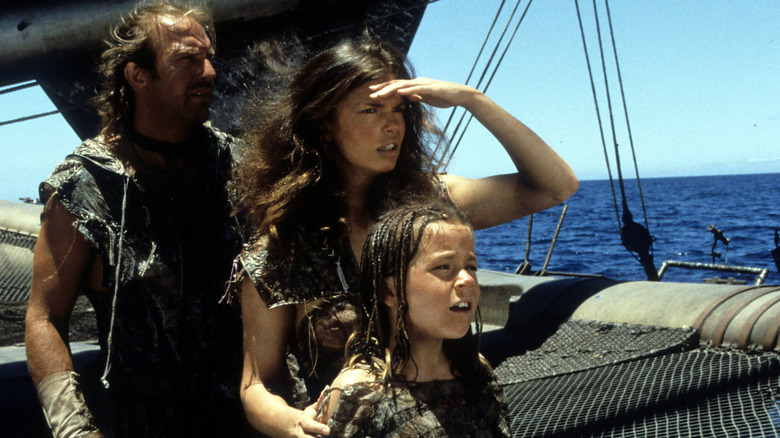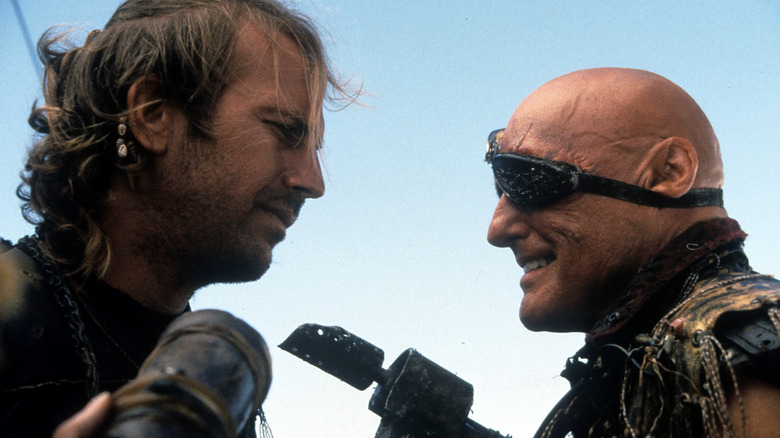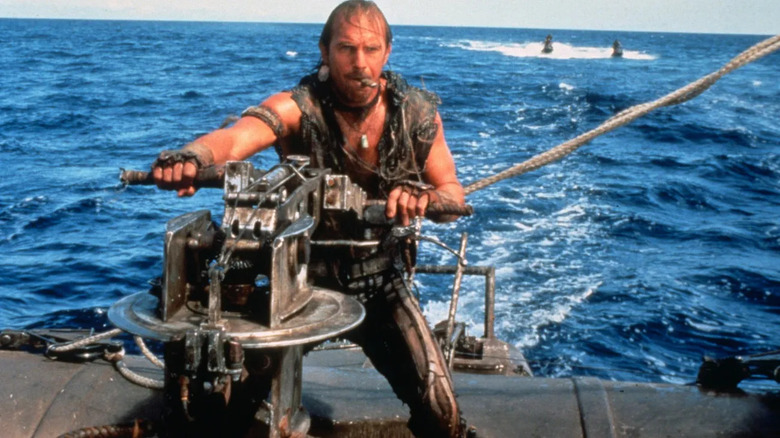Kevin Costner's Waterworld Almost Had A Totally Different Soundtrack
Filmmaking undeniably requires craft, but it also requires something additional that is less easy to teach, harder to pin down, and impossible to replicate. In short, it requires a kind of magic, an alchemy between the collaborators, the material, and the time period in which the movie is made. Sure, most creative people who make films as a career learn little tricks and shortcuts in order to help facilitate this, but ultimately (and to the continual annoyance of the studio bean counters), it happens or it doesn't. Just as the right actor can elevate a character and the wrong sound effect can ruin a scene, a film's original score is a key ingredient in making this alchemical mixture of cinema. While the covenant between a composer and a director tends to produce just the right kind of score the film needs, sometimes the balance is off.
While it isn't all that common, the replacement of one score with another has happened more times than one might expect. It also isn't always an indication of a difficult film or filmmakers; sometimes the mixture just isn't right. Take, for example, composer Alex North's score for Stanley Kubrick's "2001: A Space Odyssey." Though North's original music for the film certainly wasn't inappropriate (and some believe his compositions to be the superior choice for the film's music), Kubrick's decision to use pre-existing classical compositions unequivocally elevated the movie and its music to new heights.
Scoring a fantasy, horror, or science-fiction movie is a double challenge. Not only does the composer have to meet the usual requirements of supporting the film and its story, but they also have to participate in its world building. If the wrong tone is struck for the world the filmmakers wish to convey, then the mixture will be off. That's seemingly what happened in the case of 1995's "Waterworld" (which, contrary to what you may've been led to believe, was not the box office flop that nearly ended its star's career), as original composer Mark Isham's score was scrapped and composer James Newton Howard's new score had to be written and completed in record time.
Waterworld nearly featured a stranger, bleaker score
If you haven't seen "Waterworld," you've probably at least heard rumblings of its general premise. Indeed, the film is set in a distant, post-apocalyptic future where the Earth's polar ice caps have melted, causing the world's oceans to envelop the entire planet. The story follows a mutant man known only as The Mariner (Kevin Costner) as he comes across Enola (Tina Majorino), a young girl who has a tattoo that supposedly reveals the location of a place known as Dryland, aka the last habitable oasis in the world. For this, she and her mother Helen (Jeanne Tripplehorn) are being chased by evil pirates led by The Deacon (Dennis Hopper), forcing the nomadic loner Mariner to take action. The film is, essentially, a "Mad Max" ripoff, with the George Miller saga's vast deserts swapped for director Kevin Reynolds' endless seas.
Yet, despite its craven origins, "Waterworld" has a ton going for it, with Reynolds, Costner, and writers Peter Rader and David Twohy lending the film some real depth and inventiveness. Costner, in particular, gives one of the most intriguing performances of his career, allowing The Mariner to be both swashbuckling hero and an opportunistic, unlikable scoundrel. It's perhaps for these reasons why Isham chose to approach his initial score with "an introspective and restrained" tone, according to this Filmtracks review of the 2017 release of Howard's soundtrack album. Though Isham's source music for Enola's music box in the film remained, the rest of his score was thrown out, with Costner (who, by this time, had essentially taken over the movie for Reynolds after the director quit) calling it "too ethnic and bleak."
Though Isham allegedly requested another shot at it, Costner and Universal Pictures chose to go with Howard instead, whom Costner had worked with before on Lawrence Kasdan's "Wyatt Earp." To his credit, Howard managed to write his score from scratch in just six weeks, providing Costner with the kind of sweeping, blockbuster-style music he felt the movie needed to contrast with its bleak post-apocalyptic tone. Still, Howard was responsible in his scoring, and collaborated with Toto's Steve Porcaro in creating unique percussion sounds via synthesizer in order to keep the sci-fi elements of "Waterworld" alive in the film's soundscape.
Score issues were just another problem dumped onto Waterworld's shoulders
Of course, problems with the score were only the tip of the (melted) iceberg when it came to the issues that made "Waterworld" sink. The production was plagued by a media feeding frenzy regarding its $170-ish million budget, and the manufactured outrage over this only led to the film being seen by the public as a catastrophic (and/or irresponsible) disaster long before it actually hit theaters in July of 1995. There were also numerous accidents on the "Waterworld" set, due in part to the production choosing to shoot on the actual ocean (a choice which meant that bad weather plagued the shoot as well). The end result of all this was not just the creative differences between Costner and Reynolds (which led to the latter's quitting), but also the rampant uncertainty of what to do with the movie itself.
This is why "Waterworld" belongs in that special club reserved for ambitious genre films that sport numerous cuts. The Arrow Video limited edition release of the film on physical media features three cuts: the Theatrical, the Extended TV version, and something called the Ulysses Cut of "Waterworld," which may be closer to Reynolds' initial vision of the movie. With all of this chaos happening during the film's post-production, it's no wonder why Costner and Universal blinked at Isham's score (which, as of this writing, has yet to be released in any form, unlike other rejected scores such as North's for "2001" and Lalo Schifrin's for "The Exorcist"). While "Waterworld" is more misunderstood than incomplete (like the theatrical cut of "Blade Runner" was or "The Keep" is), it still feels underappreciated. Perhaps now, several decades later, people can revisit it and enjoy the movie's many charms, not least of which is Howard's rich, emotional, and invigorating score.


